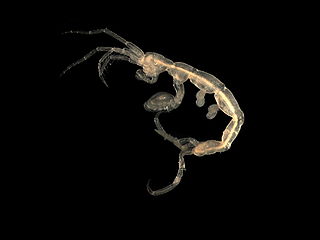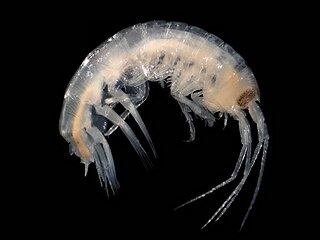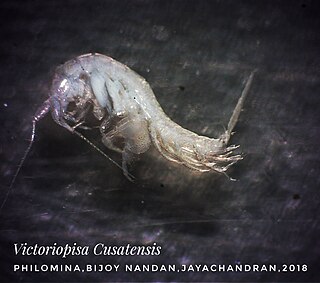 W
WAmphipoda is an order of malacostracan crustaceans with no carapace and generally with laterally compressed bodies. Amphipods range in size from 1 to 340 millimetres and are mostly detritivores or scavengers. There are more than 9,900 amphipod species so far described. They are mostly marine animals, but are found in almost all aquatic environments. Some 1,900 species live in fresh water, and the order also includes terrestrial animals and sandhoppers such as Talitrus saltator.
 W
WAeginina is a genus of amphipods in the family Caprellidae. There are at least 2 described species in Aeginina.
 W
WAmericorchestia is a genus of beach hoppers in the family Talitridae. There are about five described species in Americorchestia.
 W
WAmpithoidae is a family of amphipod crustaceans. The family has a worldwide distribution as algal dwellers. They commonly create tube-shaped nests on their host plants or algae which serve as both shelter and food. Young ampithoids develop from eggs to a larval stage within their mother's brood-pouch, formed by the appendages of her abdomen.
 W
WAoridae is a family of amphipods belonging to the order Amphipoda.
 W
WBathyporeiidae is a family of amphipods in the order Amphipoda. There are two genera in Bathyporeiidae:Amphiporeia Shoemaker, 1929 Bathyporeia Lindström, 1855
 W
WCalliopius is a genus of amphipods in the family Calliopiidae. There are about nine described species in Calliopius.
 W
WCalliopius laeviusculus is a species of amphipod in the family Calliopiidae. It is found in Europe and North America.
 W
WCaprella californica is a species of amphipod in the family Caprellidae. It is found in temperate Asia.
 W
WCorophiida is an infraorder of amphipods that contains the two parvorders Caprellidira and Corophiidira.
 W
WEpimeria is a genus of amphipods in the family Epimeriidae. There are more than 80 described species in Epimeria.
 W
WGammaridea is one of the suborders of the order Amphipoda, comprising small, shrimp-like crustaceans. Until recently, in a traditional classification, it encompassed about 7,275 (92%) of the 7,900 species of amphipods described by then, in approximately 1,000 genera, divided among around 125 families. That concept of Gammaridea included almost all freshwater amphipods, while most of the members still were marine.
 W
WGammaroidea is a superfamily of amphipods in the order Amphipoda.
 W
WThe Hyperiidea are a suborder of amphipods, small aquatic crustaceans. Unlike the other suborders of Amphipoda, hyperiids are exclusively marine and do not occur in fresh water. Hyperiids are distinguished by their large eyes and planktonic habitat. Most species of hyperiids are parasites or predators of salps and jellyfish in the plankton, although Themisto gaudichaudii and a few relatives are free-swimming predators of copepods and other small planktonic animals.
 W
WIngolfiellidea is a small suborder of amphipods with only two families, Ingolfiellidae and Metaingolfiellidae. They are small, vermiform (worm-like) animals that live "in the soft mud of the deep-sea floor, as well as in high mountain freshwater river beds, or in subterranean fresh, brackish and marine interstitial waters of continental ground waters and continental shelves".
 W
WMicroprotopus is a genus of amphipods belonging to the monotypic family Microprotopidae.
 W
WMicroprotopus is a genus of amphipods belonging to the monotypic family Microprotopidae.
 W
WNototropis swammerdamei is an amphipod crustacean of the family Atylidae.
 W
WQuadrivisio aviceps is a species of estuarine amphipod known from two localities in South Africa. After its discovery in 1937, it was not recorded again until its rediscovery at the same location in 2015.
 W
WSenticaudata is one of the four suborders of the crustacean order Amphipoda. It includes some 5000 species, which is more than 50% or the currently recognized amphipod diversity.
 W
WStenothoidae is a family of arthropods in the order Amphipoda.
 W
WTalitrida is an infraorder of amphipods in the subclass Senticaudata.
 W
WTransorchestia enigmatica is a species of beach hopper in the family Talitridae. So far, it has only been found in Lake Merritt in Oakland, California, where it was found by Jim Carlton in 1962. In 1967, Carlton and Edward L. Bousfield of the National Museum of Canada published a paper naming it Orchestia enigmatica. Bousfield re-classified it as Transorchestia enigmatica in 1982. It is not thought to be endemic to California. Its closest known relative is the Transorchestia chiliensis.
 W
WVictoriopisa cusatensis is a amphipod species in the family Eriopisidae. The species name ‘cusatensis’ refers to the Cochin University of Science and Technology (CUSAT). This species has been described by the team of researchers in 2018 from the Valanthakad mangrove area of Vembanad backwater.